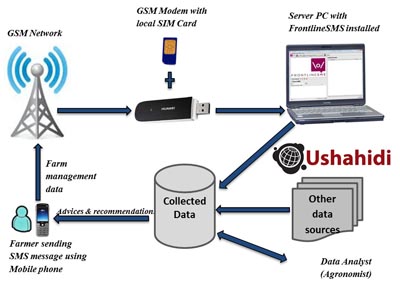Data availability often limits detailed assessment and explanation of yield gaps at farm level. Bottom-up data collection approaches (e.g. crowdsourcing) can be used to overcome lack of data and improve yield gap analysis. A case study with 50 farmers selected from 5 districts was carried out in Ethiopia. The main objective of the case study was to explore the opportunities and applicability of innovative bottom-up data collection approaches like crowdsourcing (using SMS) and digital devices (tablets) to collect factors that could explain yield gap. Detailed socio-economic and agronomic data were collected using tablets. Besides, short message system (SMS) using farmers owned basic phones was tested to assess its applicability to collect cropping and event calendar information (e.g. sowing date, weeding date) and incidence of pest and diseases directly from farmers.
Description of the technologies tested
Open Data Kit (ODK): Open data kit is a free and open-source set of tools which was designed to help organisations build information services. ODK provides solution to build a data collection form, to collect data on a tablet device and send it to a central server and aggregate the collected data on a server and retrieve it in a useful format. The ODK collect app was used to run the digital version of the complete field book on Nexus 7 tablets and collect both socio-economic and agronomic data and send to an ODK aggregate server (Fig. 1)

Figure 1: Overview of the data collection flow using tablets running the ODK collect app
|
FrontlineSMS and Ushahidi: connected together FrontlineSMS and Ushahidi are both free and open source software tools, commonly used by social change projects. FrontlineSMS enable users to send, receive and manage large numbers of incoming and outgoing SMS (http://www.frontlinesms.com/). FrontlineSMS does not require the internet to work, but does need to be connected to a mobile network. Ushahidi is a platform for collecting, visualising and mapping information (http://www.ushahidi.com/). Using these tools together can produce good results, with FrontlineSMS being used as a tool which can manage incoming SMS data which can then be visually represented using Ushahidi. The cloud-based version of Ushahidi (Crowdmap) was used in this pilot study to receive an automatically forwarded SMS message from the FrontlineSMS application. FrontlineSMS application uses a local SIM card; data sent to the application can only be accessed by people who have access to the local computer where the FrontlineSMS application is installed. To overcome this limitation, we linked the FrontlineSMS application with the Crowdmap platform so that SMS data received by FrontlineSMS is automatically forwarded to the Crowdmap platform and project partners from the implementation area and have access to internet can also access the SMS data sent. |
Figure 2: Overview of the information flow between the farmer and N2Africa project |
Over the growing season, farmers in the five districts send around 165 SMS messages, 35 farmers were active and provided the information about the activities they performed in the trial plots via SMS. At the end of the growing season, farmers were interviewed about the SMS data collection and their motivation to continue participation. Famers were asked to rank on a Likert scale (1-5, where 1 is strongly disagree and 5 is strongly agree) statements that reflected their motivation regarding continue participation in SMS data collection. Open questions were also included in the interview to give farmers more option to explain their motivation for participation. The findings indicated that farmers are motivated both intrinsically (e.g. found it interesting) and extrinsically (e.g. expect something in return from the expert) to participate in SMS data collection. In addition, farmers also have an altruistic motivation (doing something for the benefit of others e.g. to help the researcher get his/her work done). Understanding the motivation of the participants to participate and providing the right incentive in crowdsourcing initiatives can help to improve both the quantity and quality of data. Technical challenges (not capable of operating the phone), unavailability of network coverage in a specific date and lack of support from the local implementing partners (extension workers) were mentioned as the major challenges farmers faced during the SMS data collection. Loss of contact with the extension workers/local implementing partners made some farmers to withdraw from the pilot study. Lack of continuous support from local implementing partners was also one of the main challenge mentioned by extension workers who used the tablets for detailed socio-economic and agronomic information. Acknowledging the farmers with an automatic reply after receiving SMS message would have been an alternative option to keep the farmers engaged and motivated in the data provision process. The lessons learnt from this pilot are used in the implementation of other digital data collection pilot studies.
Eskender Beza*, Wageningen University, The Netherlands
* Eskender is co-financed by N2Africa


